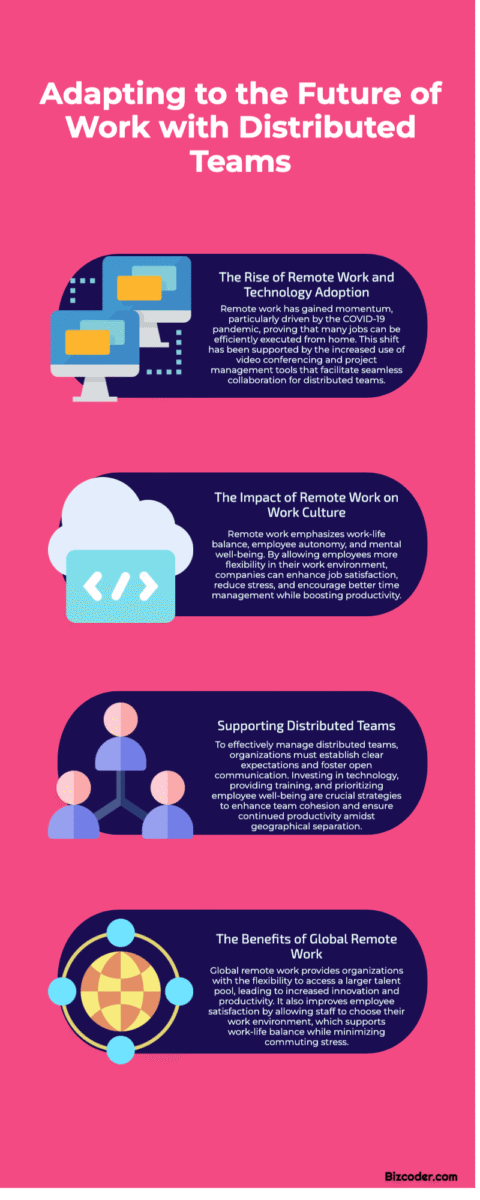Adapting to the future of work with distributed teams is crucial as remote work gains popularity and technology enables remote collaboration. The COVID-19 pandemic has shown that many jobs can be effectively done from home, accelerating the adoption of remote work.
Technology plays a critical role in facilitating remote work, with video conferencing platforms and project management tools enabling communication and collaboration. The shift to remote work has also had a significant impact on work culture, emphasizing the importance of work-life balance, employee autonomy, and mental well-being.
The Rise of Remote Work and Technology Adoption
Remote work has been on the rise, with technology playing a crucial role in enabling effective remote collaboration. The COVID-19 pandemic has further accelerated the adoption of remote work, highlighting its viability and demonstrating that many jobs can be performed efficiently from the comfort of home. As a result, telecommuting trends have witnessed a significant surge, with organizations embracing remote work tools and platforms to facilitate seamless communication and collaboration among distributed teams.
Video conferencing platforms have become an essential tool for remote work setups, allowing teams to connect face-to-face virtually and foster a sense of presence even in remote settings. These platforms enable real-time visual and audio communication, ensuring that important discussions, meetings, and presentations can take place without any geographical constraints. Similarly, project management tools have emerged as a crucial asset for remote teams, streamlining workflow, task allocation, and progress tracking, thus ensuring seamless coordination and transparency.

The integration of such remote work tools has allowed organizations to overcome the challenges of physical distance, creating a virtual workspace that facilitates efficient collaboration and productivity. Remote teams can now easily communicate, share files, brainstorm ideas, and complete projects, promoting seamless workflow even without being physically present in the same office space. This integration of technology has revolutionized the way we work, opening up new possibilities and transforming the future of work by embracing distributed teams.
Key Trends in Remote Work
| Trend | Description |
|---|---|
| Increased Telecommuting | The number of people working remotely has significantly increased, driven by the advantages it offers in terms of flexibility, work-life balance, and reduced commuting time. |
| Rise of Remote Work Tools | With the rise of remote work, there has been a corresponding surge in the adoption of tools and platforms that facilitate collaboration, communication, and project management in distributed team environments. |
| Shift to Video Conferencing | Video conferencing has become the primary mode of communication for remote teams, enabling virtual face-to-face interactions and bridging the gap between team members. |
| Emphasis on Project Management | Remote work necessitates effective project management to ensure timely completion of tasks, efficient resource allocation, and clear communication within the team. |
As organizations continue to adapt to the future of work with distributed teams, the integration of remote work tools and technology will be crucial for success. The ability to work remotely is here to stay, and leveraging the advantages of remote work can lead to increased productivity, better work-life balance, and improved employee satisfaction. By embracing these changes and investing in the right tools, organizations can thrive in the future of global remote work.
The Impact of Remote Work on Work Culture

Remote work has influenced work culture by highlighting the significance of work-life balance, employee autonomy, and mental well-being. With the shift away from traditional office setups, employees are now able to better manage their time and achieve a healthier work-life balance. This newfound flexibility allows workers to prioritize personal commitments and pursue activities outside of their professional responsibilities.
Additionally, remote work empowers employees with a greater sense of autonomy. They have the freedom to choose their work environment, whether it’s a home office, a coffee shop, or a co-working space. This autonomy fosters a sense of ownership and accountability, leading to increased motivation and productivity.
The emphasis on work-life balance and employee autonomy has also paved the way for a stronger focus on mental well-being. Remote work reduces or eliminates many stressors associated with commuting, such as traffic congestion and long travel times. It allows individuals to create a workspace that suits their needs, promoting a more comfortable and conducive work environment. Furthermore, remote work enables employees to better manage personal commitments and take breaks when needed, leading to reduced burnout and improved overall mental health.
Supporting Remote Work Culture
To support remote work culture and maximize its benefits, organizations should prioritize certain strategies. Clear expectations should be set, outlining goals and deliverables to ensure that employees understand their responsibilities. Open communication is crucial for remote teams to collaborate effectively, whether through video conferences, instant messaging, or project management tools. Investing in technology can provide remote employees with the necessary resources and tools to perform their jobs efficiently. Offering training and support can help employees navigate remote work challenges and leverage available resources. Lastly, prioritizing employee well-being is essential, as it contributes to their overall job satisfaction and productivity.
| Strategies for Remote Work Culture | Description |
|---|---|
| Set clear expectations | Establish clear goals and deliverables to ensure employees understand their responsibilities and performance expectations. |
| Foster open communication | Promote effective communication channels to facilitate collaboration and information sharing among remote team members. |
| Invest in technology | Provide remote employees with the necessary tools and resources to perform their jobs effectively and efficiently. |
| Offer training and support | Provide training and support to remote employees to help them navigate the challenges of remote work and utilize available resources. |
| Prioritize employee well-being | Recognize the importance of employee well-being, promoting work-life balance, and ensuring mental health support is available. |
By embracing the new way of work and implementing strategies that support remote work culture, organizations can adapt to the future of work with distributed teams. This shift not only benefits employees by promoting work-life balance, autonomy, and mental well-being but also allows companies to tap into the potential of a global talent pool and achieve higher levels of productivity and innovation.
Managing Remote Teams Effectively
Managing remote teams effectively requires clear expectations, open communication, technology investment, training and support, and attention to employee well-being. With the increasing popularity of remote work, organizations need to adapt their management strategies to ensure seamless collaboration and productivity across distributed teams.
Setting clear expectations is crucial for remote teams to understand their roles, responsibilities, and deliverables. This can be achieved through detailed job descriptions, project timelines, and regular feedback sessions. Clear expectations help minimize misunderstandings and ensure everyone is aligned towards common goals.
Open communication is essential for remote teams to stay connected and collaborate effectively. Utilizing video conferencing platforms, instant messaging tools, and project management software can facilitate real-time communication and enable seamless collaboration. Regular team meetings and one-on-one check-ins can help foster a sense of belonging and maintain a strong team dynamic.
| Technology Investment | Training and Support | Employee Well-being |
|---|---|---|
| Investing in reliable and secure technology infrastructure is crucial for remote teams to perform their tasks efficiently. This includes providing employees with the necessary hardware, software, and cybersecurity tools to ensure smooth remote operations. | Regular training sessions and ongoing support are vital to help remote teams adapt to new technology tools and workflows. This can include providing training materials, hosting webinars, and offering dedicated IT support to address any technical challenges. | Remote work can blur the boundaries between work and personal life, leading to potential burnout and decreased well-being. Employers should prioritize employee well-being by promoting work-life balance, encouraging breaks, and providing resources for mental health support. |
The Potential of Global Remote Work

Global remote work holds the potential for increased flexibility, productivity, and employee satisfaction. As more organizations adapt to distributed teams, they are discovering the benefits of allowing employees to work from anywhere in the world. This shift in the way we work not only provides employees with the freedom to choose their work environment but also enables organizations to tap into talent pools from different locations.
One of the key advantages of global remote work is the flexibility it offers. Employees can work at times that suit them best, allowing for greater work-life balance. This flexibility leads to increased productivity as individuals can optimize their work schedules to align with their peak performance hours. It also reduces commuting time and stress, giving employees more time to focus on their work.
The satisfaction of employees is another significant advantage of global remote work. When employees have the flexibility to work from anywhere, they are more likely to feel trusted and valued by their organization. This autonomy leads to higher job satisfaction and a stronger sense of loyalty. Additionally, remote work eliminates the geographical barriers to finding suitable talent, allowing organizations to attract and retain top professionals from around the world.
| Advantages of Global Remote Work |
|---|
| Flexibility |
| Increased productivity |
| Employee satisfaction |
As organizations continue to embrace global remote work, it is important to create an environment that supports distributed teams. This includes coordinating asynchronous schedules to accommodate different time zones, developing a consistent employee experience regardless of location, and addressing any cultural distinctions that may arise. It is also crucial to resolve issues promptly to avoid them becoming systemic and to provide viable childcare options for employees who may be balancing work and family responsibilities.
Benefits of Distributed Teams

Distributed teams offer numerous benefits, including scalability, a consistent employee experience, access to global talent, efficiency, innovation, and deep connections and loyalty. Let’s take a closer look at each of these advantages:
Scalability
A distributed team allows organizations to scale their workforce quickly and effectively. By tapping into talent from different locations, businesses can expand their operations without being limited by geographical boundaries. This flexibility in scaling up or down enables companies to adapt to changing market demands and seize growth opportunities.
Consistent Employee Experience
With the use of technology and standardized processes, distributed teams can provide a consistent employee experience regardless of location. Employees can access the same tools, resources, and collaboration platforms, ensuring seamless communication and workflow. This consistency fosters a sense of unity and inclusion among team members, contributing to a positive work environment.
Access to Global Talent
Distributed teams allow organizations to tap into a global talent pool. By removing geographical restrictions, companies can access individuals with diverse skills, experiences, and cultural perspectives. This access to global talent increases the potential for innovation, creativity, and problem-solving, leading to higher-quality outputs and enhanced competitiveness in the market.
Efficiency and Innovation
Distributed teams often leverage technology and digital tools to streamline processes and enhance collaboration. With the right communication and project management tools in place, teams can work efficiently, eliminating the need for excessive paperwork or in-person meetings. This efficiency promotes faster decision-making, improved productivity, and the ability to adopt new technologies and innovative approaches.
Deep Connections and Loyalty
While physical distance may separate distributed team members, the use of technology can foster close-knit relationships and a strong sense of loyalty. Virtual team-building activities, regular communication, and shared goals create a sense of camaraderie and belonging among team members. This deep connection contributes to higher levels of engagement, job satisfaction, and long-term commitment to the organization.
| Advantages of Distributed Teams | Key Benefits |
|---|---|
| Scalability | Quick and effective workforce expansion |
| Consistent Employee Experience | Unified tools, resources, and collaboration platforms |
| Access to Global Talent | Diverse skills, experiences, and perspectives |
| Efficiency and Innovation | Streamlined processes and improved productivity |
| Deep Connections and Loyalty | Strong relationships and long-term commitment |
Supporting Distributed Teams

To support distributed teams, it is important to coordinate asynchronous schedules, develop a consistent employee experience, address cultural distinctions, resolve issues promptly, offer viable childcare options, avoid information silos, and foster deep connections and loyalty.
Coordinating asynchronous schedules is crucial in distributed teams where team members may be in different time zones. This allows for flexibility and ensures that everyone can work at their most productive times. By providing guidelines and tools for effective communication and collaboration across different time zones, teams can work together seamlessly despite working in different hours.
| Issue | Prompt Resolution |
|---|---|
| Technical difficulties | Establish a dedicated IT support system to address technical issues promptly and minimize downtime. |
| Communication breakdown | Encourage open communication channels and provide guidelines for resolving conflicts or miscommunications efficiently. |
In addition to coordinating schedules, developing a consistent employee experience is essential for fostering a sense of belonging and unity within distributed teams. Organizations should focus on creating a shared culture and values, regardless of physical location. Incorporating team-building activities, virtual workshops, and regular check-ins can help foster a sense of camaraderie and promote collaboration.
Resolving issues promptly is crucial to maintaining a healthy and productive distributed team. By having clear protocols and channels for reporting and resolving issues, organizations can prevent them from escalating and negatively impacting team dynamics. Regular check-ins, feedback sessions, and a supportive management approach contribute to a positive work environment and foster employee well-being.
Childcare Options and Deep Connections
Offering viable childcare options is crucial for distributed teams, especially for employees with young children. Providing resources and support for childcare, such as remote nanny services or flexible work hours, helps employees balance their work responsibilities with family obligations. This not only boosts employee productivity but also enhances employee loyalty and satisfaction.
Avoiding information silos is essential in distributed teams to ensure that everyone has access to relevant information. Implementing effective collaboration tools, document sharing platforms, and project management systems helps create transparency and allows team members to stay updated on projects and relevant information. This fosters a collaborative and inclusive work environment where everyone feels valued and informed.
Fostering deep connections and loyalty within distributed teams is crucial for long-term success. Encouraging team bonding activities, organizing virtual team-building events, and recognizing team achievements are effective ways to build trust, strengthen relationships, and promote loyalty among team members. Prioritizing employee well-being, providing opportunities for personal growth, and acknowledging individual contributions also contribute to fostering deep connections and loyalty.
By implementing these strategies and supporting distributed teams, organizations can create a work environment that fosters collaboration, inclusivity, and productivity, ultimately thriving in the future of global remote work.
Embracing the New Way of Work
Embracing the new way of work and leveraging the advantages of remote work are crucial for organizations to thrive in the future of global remote work. The COVID-19 pandemic has forced businesses to adapt, showing that remote work is not only possible but often highly effective. With the right technology and tools, teams can collaborate seamlessly regardless of their physical location.
One of the key advantages of remote work is the flexibility it offers. Employees can work from anywhere, allowing organizations to tap into talent from around the world. This not only expands the pool of potential candidates but also brings diverse perspectives and fresh ideas to the table. Additionally, remote work has been shown to increase productivity, as employees have more control over their work environment and can tailor it to their preferences.
Another essential aspect of embracing remote work is prioritizing employee satisfaction. By enabling a healthy work-life balance and promoting employee autonomy, organizations can create a positive and supportive work culture. Remote work also reduces commute time and provides more opportunities for employees to pursue personal interests, leading to increased job satisfaction and overall well-being.
| Advantages of Embracing Remote Work: |
|---|
| Flexibility to tap into global talent |
| Increase in productivity |
| Promotion of work-life balance |
| Enhanced employee satisfaction |
As more organizations transition to remote work, it is crucial to invest in the right technology and provide training and support to ensure smooth operations. Clear expectations and open communication channels are vital for remote teams to collaborate effectively. Organizations should also address potential challenges such as cultural distinctions and the risk of information silos.












